IMPACT
UNIVERSITY OF MARYLAND MEDICAL CENTER
NEWS FOR DONORS AND FRIENDS
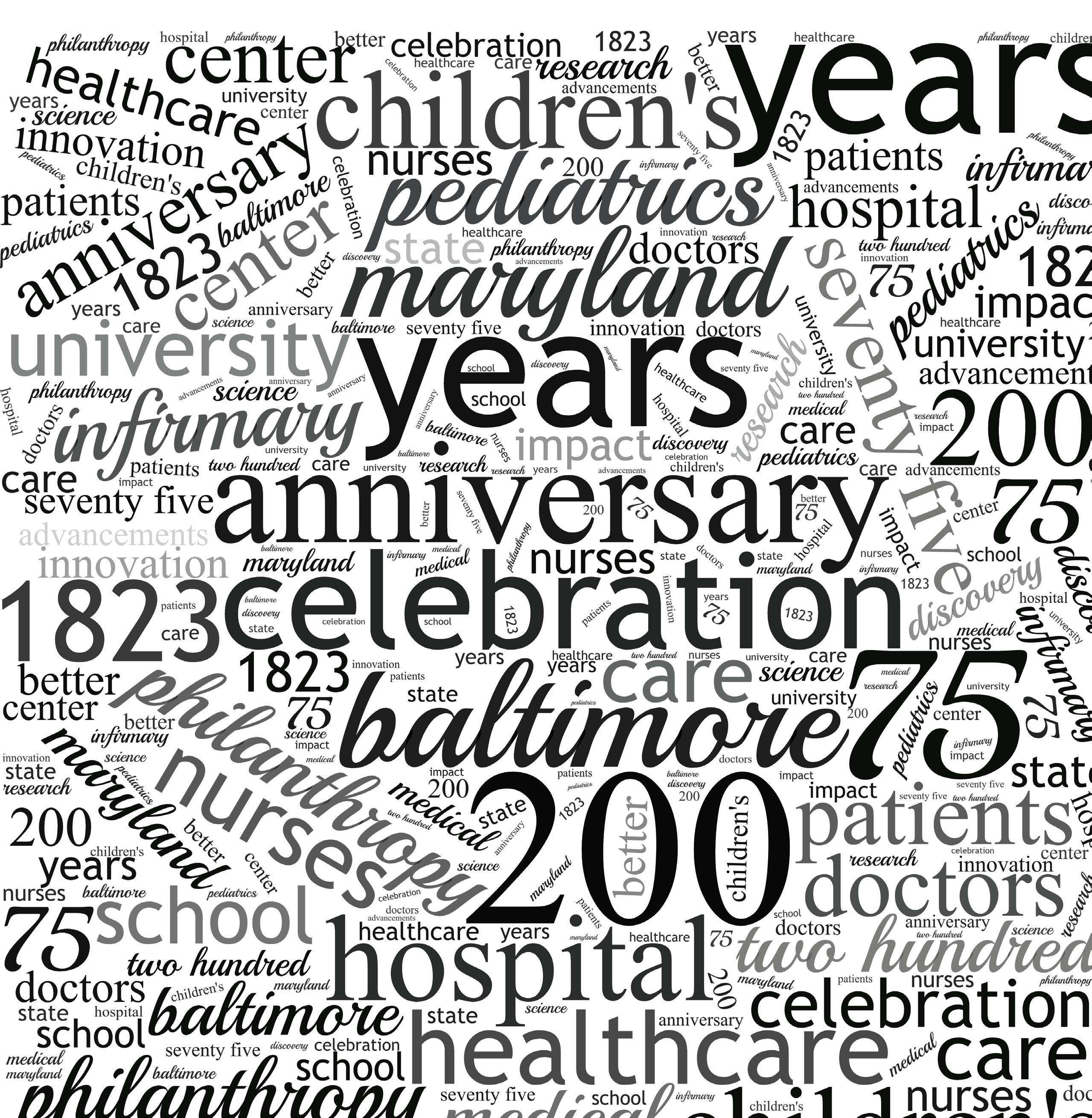


The UMMS Foundation is undertaking an important transformation this year.
These changes correlate with changes in leadership over the past two years at the University of Maryland Medical Center (UMMC) and the University of Maryland School of Medicine (UMSOM), and our shared commitment to philanthropic collaboration for professorships, research, operations, and facilities.
We are happy to announce the recent appointment of Heather S. Culp, JD, as senior vice president, chief philanthropy officer, and senior associate dean for both institutions. Heather will oversee and direct philanthropy efforts to strengthen partnership and alignment across UMMC and UMSOM. She will work with leadership of both the new UMMS Foundation Board of Directors chaired by Barry Gossett, retired chairman and CEO of Baltimorebased Acton Mobile Industries, and the UMSOM Board of Visitors chaired by Cynthia Egan, a corporate director and former operating executive at both Fidelity Investments and T. Rowe Price.

This new structure will fortify our collaborative focus to support our patients, families, physicians, and staff. It also will ensure a more donor-centric approach to philanthropy that includes the priorities of the Medical Center and School of Medicine.
By working together, we know we will have an even greater impact on research, education, and clinical care for our community, our state, and beyond.
Bert W. O’Malley, MD President and Chief Executive Officer, University of Maryland Medical Center Professor of Otorhinolaryngology, Head and Neck Surgery University of Maryland School of Medicine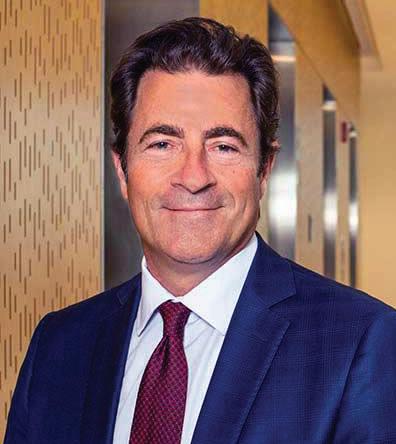
 Mark T. Gladwin, MD Vice President for Medical Affairs, University of Maryland, Baltimore
John Z. and Akiko K. Bowers Distinguished Professor and Dean, University of Maryland School of Medicine
Mark T. Gladwin, MD Vice President for Medical Affairs, University of Maryland, Baltimore
John Z. and Akiko K. Bowers Distinguished Professor and Dean, University of Maryland School of Medicine
Senior advancement leader, Heather S. Culp, JD, will advance fundraising strategies for the University of Maryland Medical Center (UMMC) Downtown and Midtown campuses, University of Maryland School of Medicine (UMSOM), and the University of Maryland Rehabilitation & Orthopaedic Institute. As the chief philanthropy officer, senior vice president, and senior associate dean, Heather will build on the mutual commitment of these institutions to collaborate in ways that drive breakthroughs and improve patient-centered care for communities across the state.
“As a Marylander committed to UMMC and the UM School of Medicine’s public mission, I am grateful for the opportunity to join the team at this transformational moment in its history,” Heather said. “I am eager to partner with leaders, donors, board members, and the community to advance medical education and enhance health care in Baltimore and beyond.”
Heather S. Culp, JD, oversees UMMC and UMSOM philanthropic teams to strengthen the impact of philanthropy on patient-centered care, discovery-based medicine, and education.
Heather’s oversight will strengthen philanthropic collaboration and alignment across both the UMMS Foundation and UM School of Medicine Development teams. “Every day, we see the power of philanthropy,” said Bert W. O’Malley, MD, president and CEO of the University of Maryland Medical Center. “I look forward to working with Heather to develop meaningful and lasting connections to our mission to advance discovery and patient-centered care.”
Heather’s expertise in philanthropy spans both discovery-based medicine and patient-focused care and how they coalesce. “Her experience and expertise will help University of Maryland Medicine philanthropy attract resources that will move our institution forward in new and significant ways,” said Mark T. Gladwin, MD, vice president for Medical Affairs, University of Maryland, Baltimore and the John Z. and Akiko K. Bowers Distinguished
Professor and Dean, University of Maryland School of Medicine.
Heather has more than 15 years of experience managing philanthropy teams and leading comprehensive fundraising campaigns for academic institutions. Most recently, she served as executive director of development for The Fund for Johns Hopkins Medicine at Johns Hopkins University, leading all aspects of fundraising for the Department of Neurology and Brain Sciences. Prior to her work at JHU, Heather held fundraising roles at the University of Maryland Carey School of Law and Washington College, developing a solid reputation of delivering success through strong senior leadership and alumni engagement. She also spent several years as an attorney in a private law practice focused on commercial litigation, estate planning and administration.
“As a Marylander committed to UMMC and the UM School of Medicine’s public mission, I am grateful for the opportunity to join the team at this transformational moment in its history.”
Heather S. Culp, JD
Harry Brodie, PhD, honors the life of his wife, Angela Brodie, PhD, and their dedication and commitment to scientific research.

Scientific research builds upon itself. It often spans decades and revolutionizes initial discoveries to create more powerful outcomes. One dead end can lead to something bigger, making scientific development a cumulative triumph. Such is the story of aromatase inhibitors.
“It’s interesting how science works,” said Harry Brodie, PhD. “We got to a treatment for breast cancer because of a request for proposals that had to do with reproduction. It could have ended in a failed project that no one would remember; instead it ended up in something more important. We just followed the science.”
The research behind aromatase inhibitors began at the Worcester Foundation for Experimental Biology Institute in Shrewsbury, MA, under Harry and came to fruition under his wife, Angela Hartley Brodie, PhD, at the University of Maryland School of Medicine (UMSOM) and the University of Maryland Greenebaum Comprehensive Cancer Center (UMGCCC). Her work developing aromatase inhibitors was a paradigm shift on how to reduce the level of estrogen in the body and thereby block the growth of cancer cells. Aromatase is an enzyme that plays a key role in the biosynthesis of estrogen, which fuels the growth of cancer cells.
Harry wanted to honor Angela’s life and their dedication and commitment as scientists. He understands firsthand the importance of philanthropy. “We were always looking for how we could get grants and contracts because that’s how we existed.” He made a transformative estate gift of $1 million to the Building for Life Campaign to help fund the new home of UMGCCC, the Roslyn and Leonard Stoler Center for Advanced Medicine, and to increase the Department of Pharmacology endowed professorship established by the Greenebaum Family Foundation to honor Angela and Harry’s work. “I am fortunate to be able to do this,” Harry said. “It’s where Angela worked for so long and the field where she made her biggest contribution.”
At the investiture of Stuart S. Martin, PhD, professor of pharmacology and physiology at UMSOM, as the inaugural Drs. Angela and Harry Brodie Professor of Translational Cancer Research, Michael Greenebaum said that his late mother, Marlene, was treated with an aromatase inhibitor after her breast cancer recurred. “The development of the aromatase inhibitor by the Brodies really is what kept my mom alive for many years.”
Angela’s distinguished career at UMSOM and UMGCCC spanned 37 years until her retirement in 2016. She was a professor of pharmacology at the school and a researcher in the Hormone Responsive Cancers Program at the center. Illness forced her into retirement in 2016; and on June 7, 2017, at 82, she died from pancreatic cancer and complications due to Parkinson’s Disease.
Harry started at the Worcester Foundation with a postdoctoral fellowship funded by the National Institute of Child Health and Human Development. “The Worcester Foundation was well known by the time I arrived because they had just a year or two earlier gotten approval for the first contraceptive pill,” he said.
Harry studied steroid metabolism and the transformation of male and female hormones. With an NIH contract to develop a new contraceptive, his team had limited success blocking reproduction in mammals
such as rats. “We were successful in the sense that—if we did inject the inhibitor—we would see fewer pups in the fallopian tubes than if we didn’t,” he explained. “We could never get to 100 percent.”
At that time, breast cancer research came to the forefront, and he rerouted his research. “The principle was the same,” Harry said. “It was pretty well accepted that estrogen played a role in blocking the cancer. If you inhibited estrogen, you couldn’t stop it completely, but you could reduce the development. These compounds reduced estrogen and interfered with conception so they might inhibit cancer growth.”
By then he and Angela had met and married in 1964. Following a hiatus that spanned the birth of their sons, John and Mark, “she joined my group in 1971 and we became research partners,” Harry said. They developed several steroidal aromatase inhibitors. However, their project stalled because their findings were limited to lab animals. “We were trying to get drug companies interested in it, but it wasn’t happening,” he said. “It was a bit discouraging.” With a young family to support and the tenuous nature of research support, Harry made the decision to join NIH and the family moved to Maryland in 1979. “I like to say I became a grant giver, rather than a grant getter,” he explained.
Angela kept pushing the science forward at UMSOM and UMGCCC. In 1982, her collaboration with British oncologist, Charles Coombes, lead to successful clinical trials funded by Novartis and the eventual market of the first aromatase inhibitor drug, Formestane, in 1994. The drug has helped thousands of women conquer breast cancer. During her tenure, Angela received her first of many major awards: the Brinker Award for Scientific Distinction from the Susan G. Komen Breast Cancer Foundation.
“I am fortunate to be able to do this.
It’s where Angela worked for so long and the field where she made her biggest contribution.”
Harry Brodie, PhD
TheUniversity of Maryland Medical Center
(UMMC) has kicked off a year-long celebration to mark its 200th year of caring for Marylanders. In October 1823, UMMC was founded as the Baltimore infirmary in partnership with the University of Maryland School of Medicine.
With just 60 beds, the modest hospital at the corner of Lombard and Green streets in downtown Baltimore opened it doors to heal local residents and serve as an institution for medical discovery and training, becoming the nation’s first publicly established teaching hospital.
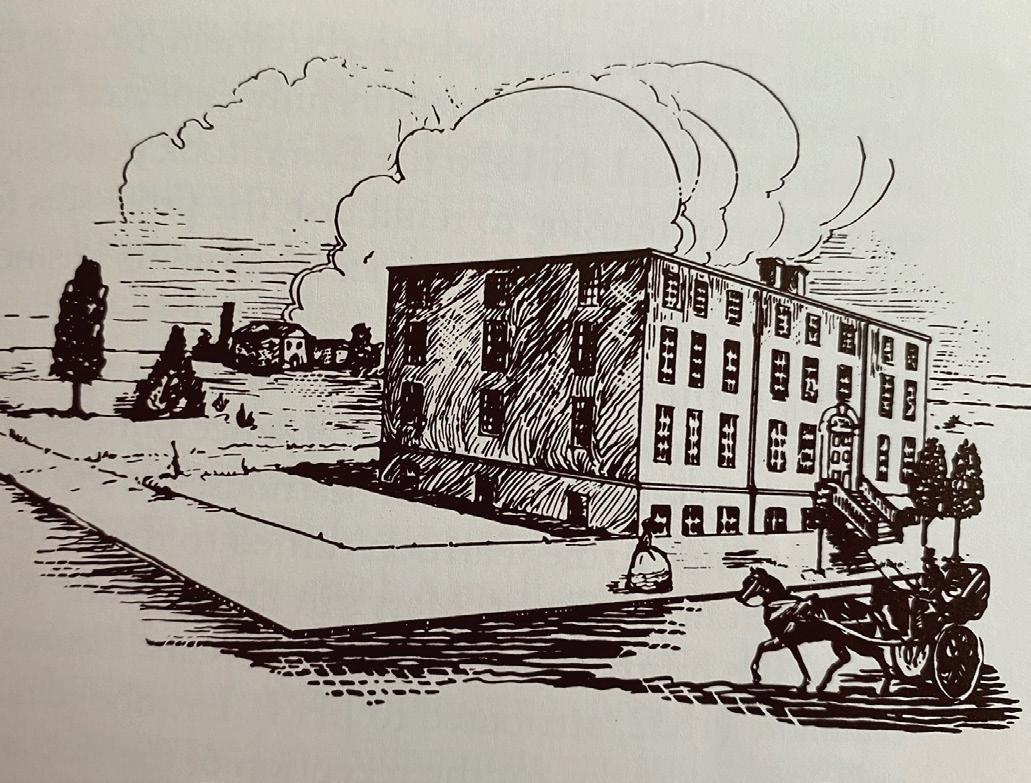
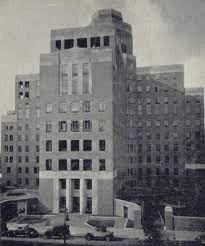
UMMC has grown into the flagship academic medical center for the University of Maryland Medical System with dozens of specialty services and ambulatory care centers, and nearly 1,000 inpatient beds.
“UMMC has transformed the face of health care in the region and has cemented its reputation as a national leader in academic medicine by holding steadfast to our mission, meeting the health care needs of our communities and blazing new trails through discovery-based medicine,” said Bert W. O’Malley, MD, president and CEO of UMMC.
The medical center’s myriad of notable achievements and first-of-its-kind advancements range from its world-renowned Shock Trauma
The University of Maryland Medical Center celebrates 200 years of notable achievements and first-of-its-kind advancements in patient care and discovery-based medicine.
Center and the University of Maryland Greenebaum Comprehensive Cancer Center to its award-winning transplant, heart and vascular, neurology, and neurosurgery programs, and its regional leadership in primary care, behavioral health, and community health.
“For the last two centuries and for years to come, the University of Maryland Medical Center will be defined by its profound and enduring tradition of excellence in patient care, innovation, and educating tomorrow’s physicians and health professionals,” said Alison G. Brown, MPH, BSN, president of UMMC Midtown Campus. ·
First successful transplant of porcine heart into adult human with end-stage heart disease
First in Maryland to provide centralized, comprehensive care for adults with autism, epilepsy, and intellectual disabilities
First in the world to use a drone/unmanned aircraft to carry an organ for transplantation (kidney)
First in the U.S. to treat a patient with focused ultrasound for bilateral essential tremor
First Heart-Lung transplant in a pediatric patient in Maryland
First in Maryland to perform aortic valve surgery with an improved tissue valve that lasts two to three times longer than other valves and does not require daily blood thinners
First in the U.S. to open the blood-brain barrier to treat brain cancer with chemotherapy
First in the U.S. to open the blood-brain barrier in a patient with infiltrating glioma/brain tumor
First in the U.S. to treat chronic pain with focused ultrasound
First in the Baltimore/Washington area to offer CAR-T cell therapy for B cell lymphomas
First in the world to create and use GammaPod™ to treat early-stage breast cancer with less radiation to healthy tissue
First STEM cell use in pediatrics in Maryland
First to offer both deep-tissue external hyperthermia therapy in combination with high-precision proton-beam radiotherapy in the same facility
First in the U.S. to treat a patient with focused ultrasoundguided pallidotomy for Parkinson’s disease
First in the world to create and use the HARPOON™ System that enables minimally invasive beating-heart mitral valve repair
First in the world to complete the most comprehensive fullface transplant
First in Maryland to offer a newly approved artificial cervical disc to patients with degenerative disc disease in the neck
First in Maryland to perform combined heart and liver transplant
First in the world to develop aromatase inhibitors, a new class of drugs used worldwide, that help prevent a recurrence of breast cancer in postmenopausal women by limiting the amount of estrogen their bodies produce
First in U.S. to have performed 1,000 minimally invasive kidney removals from living kidney donors
First in world to develop compact system that works similarly to V-V extracorporeal mechanical oxygenation (ECMO), small enough to permit ambulation
First in the Mid-Atlantic region to perform minimally invasive, beating heart, multiple-vessel coronary artery bypass surgery with the assistance of a surgical robot
Hair, Heart and Health was developed, a program initiated by UMMC cardiologist Dr. Elijah Saunders that received international attention and continues to train barbers and hairstylists to pre-screen their clients for hypertension, and make referrals for medical care
Maryland’s first accredited Primary Stroke Center
Created the state’s first neonatal intensive care unit (NICU)
First Center for Celiac Disease
Elijah Saunders, MD, became Maryland’s first Black cardiologist when he completed his fellowship at UMMC
The world’s first Shock Trauma Center
Serving on a University of Maryland medical board energizes George “Chip” Doetsch III and the outcomes provide immeasurable dividends for the community for years to come. “You function as a team— not an individual donor or philanthropist—because of the magnitude of some of these projects,” Chip said. “For me, that brings energy to the equation.”
Health care is a community cornerstone, he continued. “It brings stability. When you contribute your time and resources, you never know how it’s going to impact the community or the world. You never know who might benefit. It could be somebody right next to you. It could be somebody you’ve never meet, but somebody is going to benefit from your engagement. Serving on the board allows you to help people get what they need.”
For example, the wife of an employee had complications during her third pregnancy and delivered prematurely, Chip shared. “That was about nine months after we finished up the NICU renovation. This is a guy who worked 10 feet from me every day for 13 years.”
For more than 10 years, Chip has advocated and fundraised for the University of Maryland Medical Center’s littlest patients. “I had young children when I joined the University of Maryland Children’s Hospital Board of Visitors,” he shared. “It was a place to serve that fit that time in my life personally and the needs of the community, but it’s time for a change and fresh leadership.” In March, Chip’s decade-long tenure as chair came to an end as he transitioned that same passion
and commitment to the UM School of Medicine Board of Visitors.
Chip has been instrumental in the recruitment of new board members and with philanthropic efforts that have expanded many of our programs, said Steven Czinn, MD, Drs. Rouben and Violet Jiji Endowed Professor and Chair and director of UMCH. “I have known Chip since I came to the University of Maryland in 2006, when he was a member of the Children’s Hospital Board. He has always been a tireless advocate for our organization and the children of Baltimore and throughout the state, and when he assumed the role of chair, his vision for the Children’s Hospital grew to new heights.”
As UMCH Board chair, Chip was instrumental in advancing transformative initiatives. His proudest accomplishments under his tenure include the campaign to renovate and expand the neonatal intensive care unit (NICU) to meet the rising need for specialty care and innovative research; the upcoming state-of-the-art pediatric cardiac catheterization lab renovation; and Maryland’s first adolescent behavioral pediatric ER unit architecturally and clinically designed to deliver traumainformed care for children 5 to 17 years old. Traumainformed care is a framework for treating patients who have endured abuse, neglect, violence, school issues, or other traumatic events.
“I am grateful for the time that Chip spent at the helm and am looking forward to working more closely with Stephen Lazinsky, who has taken over as chair,” Dr. Czinn
Philanthropist George Doetsch III steps down as University of Maryland Children’s Hospital Board Chair to put on a new board hat for the UM School of Medicine.
continued. “I am excited to see where we can go under his leadership.” Stephen Lazinsky, chair and past-president of Comeq, Inc., “has served with enthusiasm and energy and has gone above and beyond to make our patients feel special, arranging visits from local mascots, handing out Ravens and Orioles gear on the units, and donating winter pajamas and gifts around the holidays,” he added.
Chip is excited to see the University of Maryland Medical System from the UMSOM board’s perspective. “Serving on a board gives you a clear perspective of an organization and its needs. You learn firsthand when a doctor says, ‘If I had the resources, here’s what I could do.’” And it is rewarding to hear “‘Here’s the proficiency that we’ve been developing and getting ready to come to market,’ or ‘Here’s the clinical process that’s been innovated here that has national or international applicability,’” Chip
continued. “It’s pretty interesting how much innovation and international-scale research is being done. The folks at UMMS change lives.”
The Doetsches’ philanthropic commitment and service to UMMC began more than 30 years ago, when Chip’s father, George Doetsch, Jr., joined the R Adams Cowley Shock Trauma Center Board of Visitors. “Any good business recognizes the responsibility to give back,” Chip said. “Over the last 30 years, philanthropically, our focus has been on health care and education. Every year we allocate a piece of our operational budget to annual needs and a fund oriented toward capital campaigns or long-term larger gifts. We strive be a good corporate citizen and use the fruits of our effort to feed back into the community to make it stronger. There better be a bigger reason than making money to run a business.”
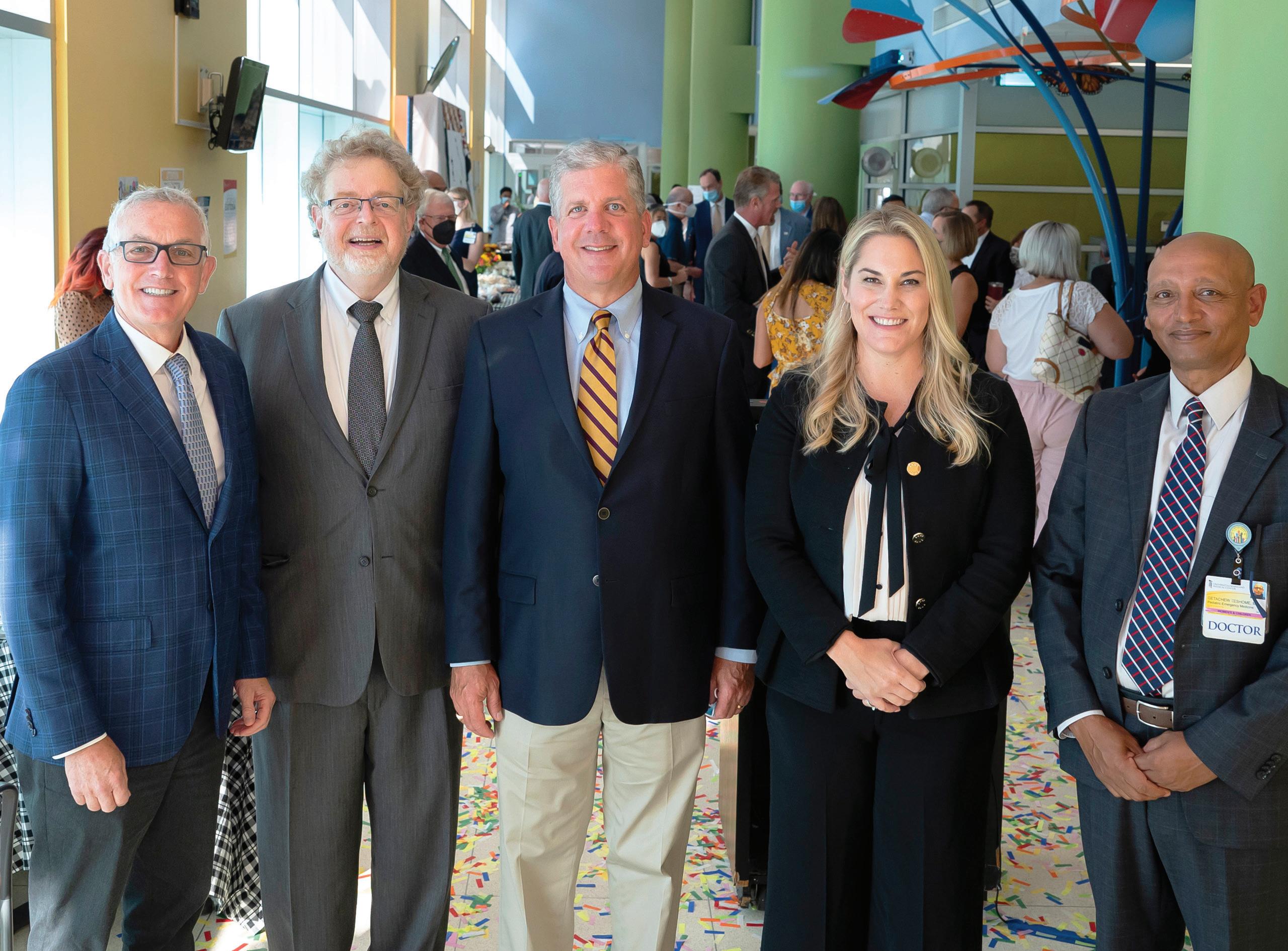
Since 1948, the University of Maryland Children’s Hospital has led the way in a profusion of innovations.


The roots of the University of Maryland Children’s Hospital (UMCH) extend back to the 1800s when the University of Maryland Medical Center was established, but it wasn’t until 1948 that the Department of Pediatrics separated from the Department of Medicine, forming its own autonomous department.
The dedicated pediatric hospital within the medical center has helped transform care for young Marylanders and is widely recognized for its distinct multidisciplinary approach and broad range of support services for children with critical and chronic illnesses from across Baltimore and the region.
“At the Children’s Hospital, it is our privilege to care for children with critical illnesses and complex, chronic conditions,” said Steven J. Czinn, MD, the Drs. Rouben and Violet Jiji Endowed Professor and Chair, Department of Pediatrics at the University of Maryland School of Medicine, and director of the University of Maryland Children’s Hospital.
distinguishes us—then and now—is our ability to integrate clinical excellence with compassionate, family-centered care and a broad range of support services. With the leadership of our exceptional physicians and our multidisciplinary care teams, we continue to improve the health of countless children across the city, region and nation.”
UMCH ranked nationally in the top children’s hospitals for pediatric cardiology and heart surgery for the fifth year in a row by U.S. News & World Report Best Children’s Hospitals 2022-23.
Pediatric care at UMMC has roots going all the way back to 1873 when a new wing for the newly formed Children’s Department and Department of Obstetrics was created in what was then the Baltimore Infirmary.

“What
The Children’s Hospital celebrates 5 years in a row on the U.S. New & World Report Best Children’s Hospitals list for cardiology and heart surgery.
2019
The Children’s Hospital is ranked for the first time as a Best Children’s Hospital for cardiology and heart surgery by U.S. New & World Report.
The first heart and lung transplant is performed in a pediatric patient in Maryland.
The Proton Center sees its first pediatric patient.
STEM cells are used in a pediatric patient for the first time in Maryland.
1969
The Children’s Heart Program opens its doors.
The Epilepsy Monitoring Unit is opened.
The pediatric Extracorporeal Membrane Oxygenation, or ECMO, program is established. ECMO is a machine to remove carbon dioxide from the blood and circulate oxygen throughout the body when a person’s lungs cannot function on their own.
1948
The Pediatric Intensive Care Unit is established, with an emphasis on clinical research.
The state’s first neonatal intensive care unit (NICU) is created. Its remodel in 2015 makes it the largest level 4 NICU in Maryland.
1977
The Children’s Hospital’s first neonatal transport program is established to provide air transport to critically ill newborns. In 1997, the Maryland Regional Neonatal Transport Program became a joint venture with The Johns Hopkins Hospital.
A study published by chief of pediatrics Edmund Bradley finds that children in low-income urban neighborhoods have abnormally high rates of lead poisoning, encouraging public health officials to test children living in these areas.
1956
The same year Pediatrics gained independence from the Department of Medicine, the pediatric wards are desegregated. It would be nearly 20 years before the Civil Rights Act of 1964 ended legal racial segregation in the United States.


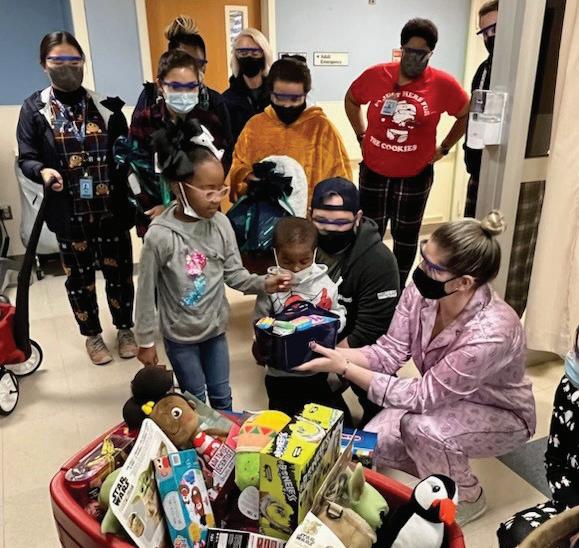
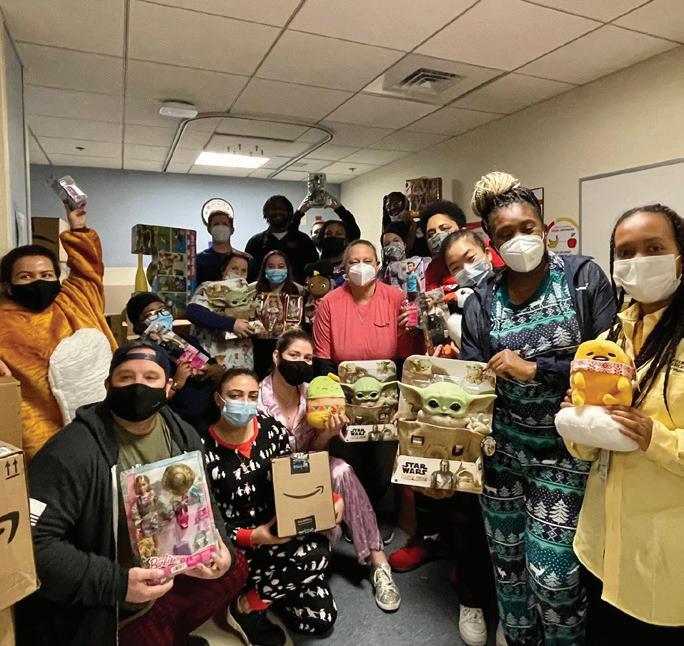

Duringthe heart of the COVID pandemic, a Facebook post evolved into a series of donations from employees of an Amazon fulfillment center in Baltimore. The BWI-2 center’s assistant general manager, Tori Wilson, took the plea of a neighbor and University of Maryland Children’s Hospital (UMCH) pediatric nurse to heart. Her request was simple: notebooks for children to draw or write in while they were hospitalized.
“I knew we could do better than that,” Tori said. She empowered her colleague, Operations Manager Sarah Eben, to lead the charge to collect toys, clothing, technology, and cash as well as the notebooks. Sarah worked with site managers from different sites in the Baltimore area and one of Amazon’s logistics partners, AMZL Logistics, to collect a truck full of donations from their associates as well as the company.
The donations started in 2021 and continued through last year based on a wish list of items they cultivated from UMCH, and the duo has no plans to stop any time soon. Their first round of donations was targeted for the hospital’s adolescent psychiatric unit. “We also did some room renovations for inpatient rooms,” Tori said. “We provided some hospital-grade recliners and refrigerators, and items to beautify their rooms and make it a more pleasant experience.”
In December, with restrictions lifted, a team of Amazon volunteers delivered the gifts in person. “Being able to interact with the kids took the experience to a whole other level,” Sarah shared. “We don’t know what these families are facing, but we’re here to provide anything that we can to try to make that experience just slightly better for them.”
Sarah and Tori are acutely aware that their support hits close to home. “We’re helping the community in which our associates work and live, and which we work in and live in,” Tori explained. “This isn’t a national partnership. This is a hyperlocal partnership. This is just people at this site who found an organization through happenstance. We were able to provide for a need that was otherwise unfilled.”
Anne Arundel County
R Adams Cowley Shock Trauma Center
American Cancer Society
Transportation for cancer patients
Baltimore City Police Department Justice Assistance Grant Program
R Adams Cowley Shock Trauma Center Violence Prevention Program
Baltimore County Government
R Adams Cowley Shock Trauma Center
Charles Crane Family Foundation
UM Children’s Hospital Breathmobile
Chesapeake Bay Trust
UM Rehabilitation & Orthopaedic Institute
Series of green infrastructure practices
Dunkin’ Joy in Childhood Foundation
UM Children’s Hospital Child Life Department
Gaming equipment
Epic
For a mobile health program for communities with social and economic barriers
France-Merrick Foundation Building for Life Campaign
Globus Medical Grants
Hand, Upper Extremity, and Microsurgical Fellowship
Governor’s Office of Crime Control and Prevention
R Adams Cowley Shock Trauma Center Violence Prevention Bridge Program
For victims of partner violence
Harford County Government
R Adams Cowley Shock Trauma Center.
Howard County Government
R Adams Cowley Shock Trauma Center
Kahlert Foundation
R Adams Cowley Shock Trauma Center
The Center for Innovation in Clinical and Translational Shock and Injury Research
Knott Foundation
UM Children’s Hospital
For vision screener for the Mother Mary Lange Catholic School
Maryland Department of Health, Office of Oral Health
UM Rehabilitation & Orthopaedic Institute
Oral health care services for children in need
Nora Roberts Foundation
UMMC and UM Rehabilitation & Orthopaedic Institute
For employee assistance program
OMeGA Medical Grants Association
R Adams Cowley Shock Trauma Center
For orthopaedic fellowships
PNC Foundation
Toward patient navigation for breast cancer patients and to provide nutritious snacks while they receive chemotherapy and specialized care
PNC Foundation
UM Children’s Hospital NICU
For Mother Goose on the Loose – Goslings for early language and literacy intervention and for additional parental support
Qlarant Foundation
UM Children’s Hospital Breathmobile
Thomas Wilson Sanitarium for Children of Baltimore City
UM Children’s Hospital Breathmobile
The UMMS Foundation is grateful for the philanthropic support we receive from corporations, foundations, and local governments. Our deepest appreciation and thanks to the following organizations:
Zonn has been on both sides of the R Adams Cowley Shock Trauma Center—as a police officer with Prince George’s County and as a patient. That perspective provided him with a clear picture of what he wanted to do when he had the opportunity of gifting a $2,500 donation from SERVPRO to a nonprofit organization of his choice.
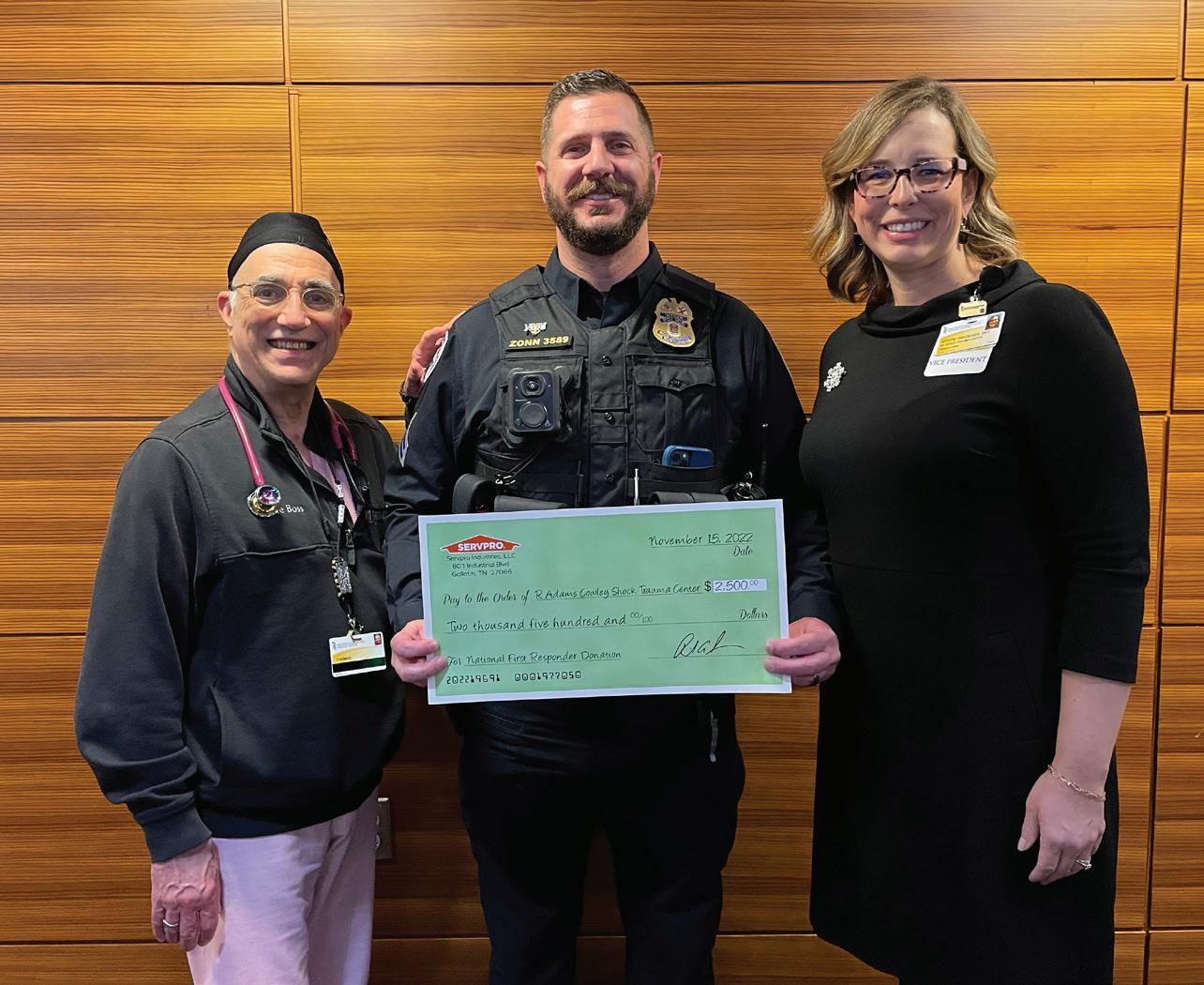
Corporal Zonn was given the honor as a SERVPRO 2022 First Responder of the Year. In February 2022, he and another officer rescued an unconscious man from a car engulfed in flames. “For me, it all came full circle,” Cpl. Zonn shared. “I wouldn’t have been able to save this guy if the [R Adams Cowley Shock Trauma Center] hadn’t saved me.”
In July 2016, while riding his motorcycle to the Prince George’s barracks for the midnight shift, he was sideswiped by an automobile. The force of the impact flipped the driver’s car and sent him flying 33 feet into a ravine. “I landed unconscious into a pool of water,” he explained. “If I didn’t have a full-face helmet on, I would have drowned.”
Most of what Cpl. Zonn recalls before and after the crash comes from third parties, including his wife, Leah, who journaled his recovery. “I have no memory four days before and eight days after the accident.”
Leah was impressed by the amount of time everyone took to keep her informed. “From the nurses to the doctors, everyone was extremely supportive,” Leah recalled. “Dr. [Raymond] Pensy and Dr. [Thomas] Scalea were very thorough and explained everything in detail.”
Miraculously, Cpl. Zonn recovered within four months from multiple broken bones, shredded tendons and
muscles, and a severe brain injury. “I went back to work like nothing even happened,” he noted. “Everyone on the scene thought I wasn’t going to make it. The Shock Trauma team did an extensive amount of work to make sure I stayed alive. My injuries were so severe that my heart kept failing so they operated on one half of my body one day; and the other half, the next.”
When Cpl. Zonn was discharged from Shock Trauma, he was transferred to the UM Rehabilitation & Orthopaedic Institute to continue his recovery. “I was doing occupational therapy, speech therapy, physical therapy, and other therapies I didn’t even know existed. I learned how to redo everything,” he added.
Going to the Shock Trauma clinic for follow up “was almost like going to see family because every single person knew who I was,” he explained. “Basically, everybody who worked on me—who kept me alive—was there at the clinic. It was a very warming experience.
“I came in so broken,” Cpl. Zonn stated. “There’s no better way for me to be able to express how appreciative I am, and my family is, for the amazing things Shock Trauma does, then to be able to give back to the people who saved my life.” ·Cpl. Zonn with Dr. Thomas Scalea, Physician-in-Chief, and Dr. Kristie Snedeker, Vice President, R Adams Cowley Shock Trauma Center.

Why should you consider a planned gift to the University of Maryland Medical Center? Through planned gifts, donors can leave a legacy behind while making a difference in the lives of others. Planned—or deferred—gifts also provide a variety of tax benefits, depending on the type of gift, and are especially beneficial for donors with large estates. UMMC appreciates each and every gift it receives from grateful patients and friends through their estate plans.
There are many planned giving opportunities available to leave a lasting legacy:
▪ Given as part of a will or trust
▪ Donate a specific cash amount or percentage of the overall estate
▪ Can be revoked if life circumstances change
Appreciated Securities
▪ Avoid capital gains taxes
▪ Same charitable deduction as for cash gifts
Life Insurance
▪ Gift a policy outright or name a charity as a beneficiary
Real Estate
▪ Immediate tax deduction for the fairmarket property value
▪ Avoids hassle of selling property
Retirement Plan Assets
▪ Assets from retirement accounts are not subject to income tax (as would be the case if passed to heirs)
▪ Easy beneficiary designation documentation is all that is required
▪ Can be revoked if life circumstances change
IRA Rollover
▪ Donors 70 ½ and over can make gifts directly out of IRAs and not be taxed
▪ Gifts count toward the donor’s required minimum distribution
▪ Gifts made directly to charity are not recognized as taxable income
To learn more about planned giving opportunities, please visit ummsf.giftlegacy.com or call 410-328-5770.
Universit y Maryland of 110 S. Paca Street, 9th Floor Baltimore, MD 21201
ummsfoundation.org
410.328.5770
2022 marked a significant occasion for the foundation and medical center a return to in-person events. Below is a selection of photos from our various events in the summer and fall of 2022.
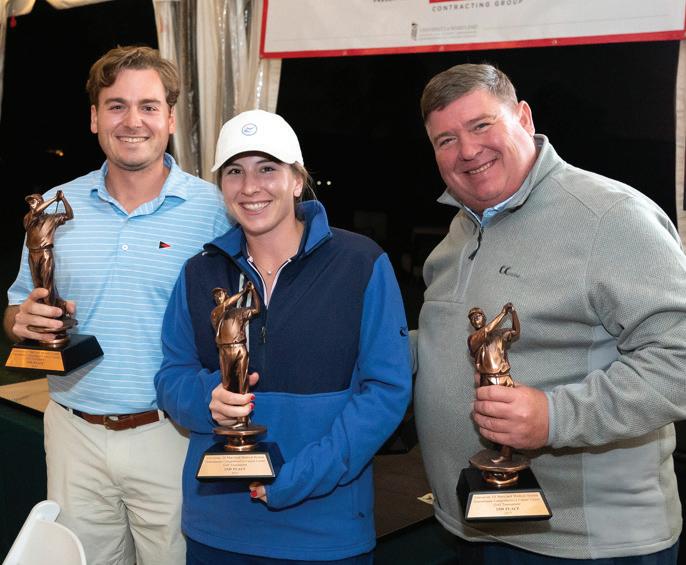


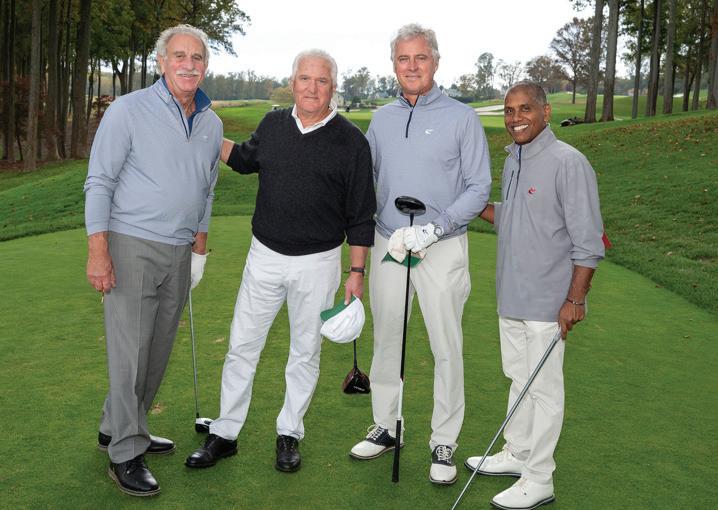

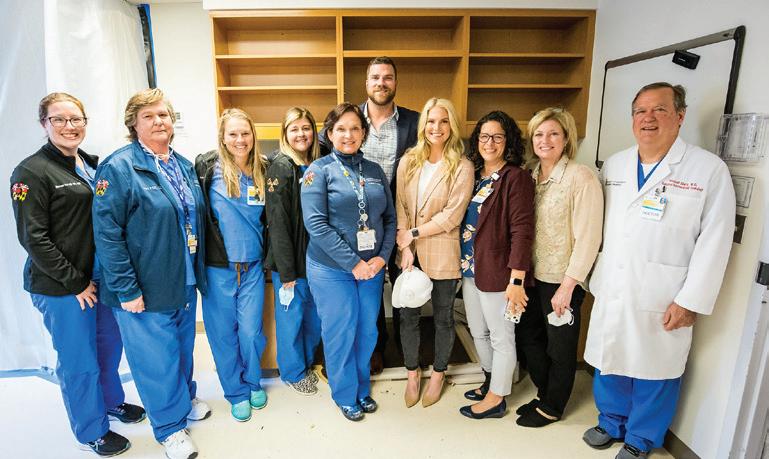
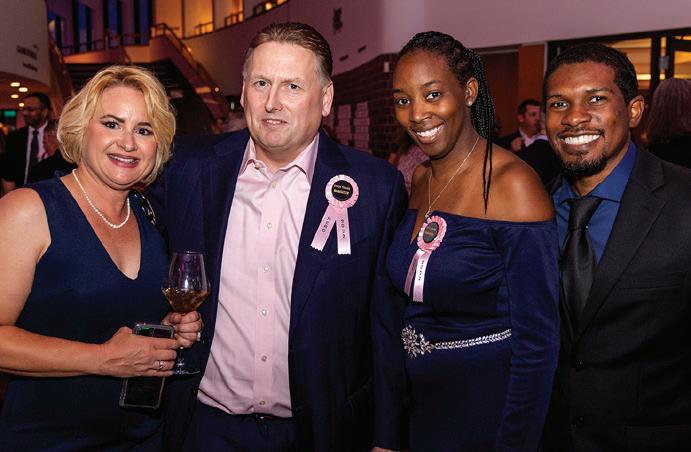

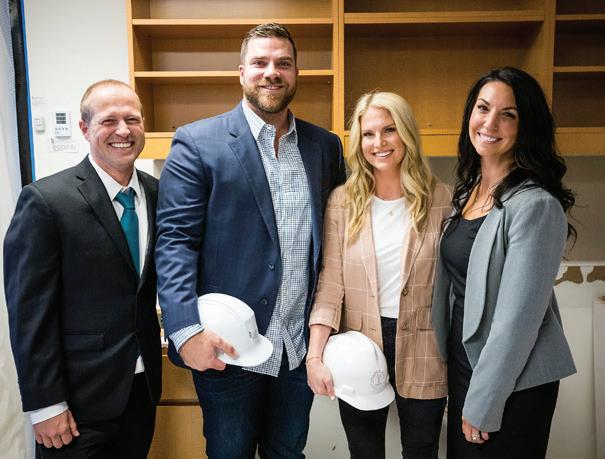

IMPACT is published by the University of Maryland Medical System Foundation.
Bert W. O’Malley, MD President and Chief Executive Officer, UMMC Professor of Otorhinolaryngology, Head and Neck Surgery University of Maryland School of Medicine
Heather S. Culp, JD Senior Vice President, Chief Philanthropy Officer, Senior Associate Dean University of Maryland Medical Center University of Maryland School of Medicine
Copy: Diana Mota
Design: Elizabeth Shea
Photography: Larry Canner, Sid Keiser, Whitney Krapf, Chris Lewkovich, Diana Mota, Retro Lens Photography, Molly Saint-James and Brian Slack.
To make a gift online, visit ummsfoundation.org/impact
To opt out from receiving future fundraising communications from the UMMS Foundation, please email umms-foundation@umm.edu.
R Adams Cowley Shock Trauma Center celebration on September 10 at the Joseph Meyerhoff Symphomy Hall. Pediatric Emergency Department renovation kick-off on August 30. Pediatric Catheterization Lab groundbreaking on November 9. University of Maryland Greenebaum Comprehensive Cancer Center Golf Tournament on October 17 at Caves Valley Golf Club.